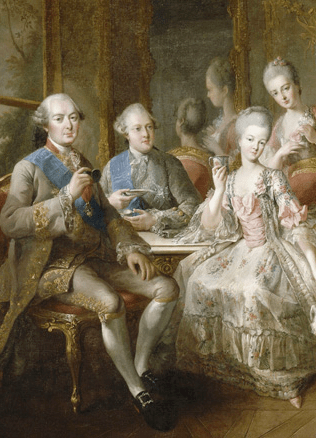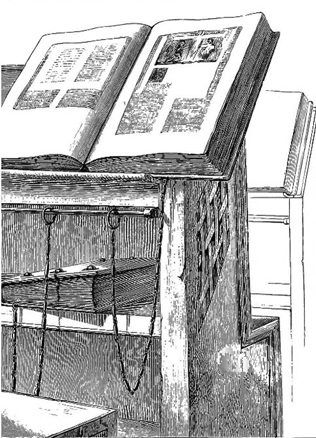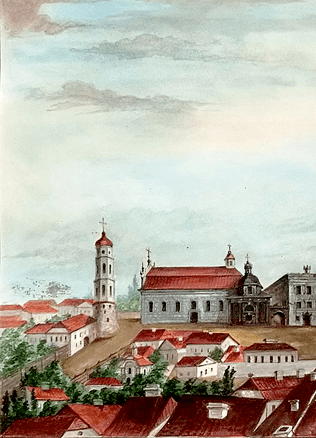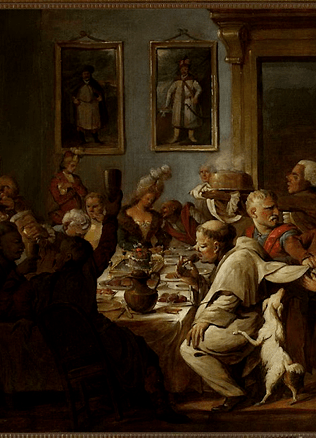Commissions on War and Treasury of the Grand Duchy of Lithuania
The state reforms necessary to strengthen the Commonwealth of the Two Nations were started to be implemented during the interregnum of 1764 and during the years of the rule of Stanisław August Poniatowski. In the course of carrying out the reforms, when considering economic issues at the Sejm, the principle of the majority of votes was introduced and measures were taken to restrict self-will of hetmans and treasurers. After the executive institutions subordinated to the Sejm had been founded – the Commissions on War and the Treasury of the Kingdom of Poland and the Grand Duchy of Lithuania – from unrestricted officials the treasurers and hetmans turned into chairmen – presidents (Pol. prezes) of the institutions, which administered exclusively the Treasury and the Army. The law on founding the Commissions on the Treasury and War was adopted at the Sejm in 1764, and in 1775, a new administrative reform was already implemented: the respective departments of the Permanent Council (which operated until 1789) was entrusted with control of the Lithuanian and Polish Commissions on the Treasury and War.
The new order in the Treasury
The Commission on the Treasury had to consist of 11 members. Two of them – the Grand Treasurer and the Treasurer of the Court– were included in the composition of the Commission ex officio, nine members of the Commission were elected at the Sejm from the fourfold list of the candidates presented by the King: two commissioners were elected from the Senate, seven – from the members of the House of Representatives. The Grand Treasurer fulfilled the functions of the President (Chairman) of the Commission both in Poland and in Lithuania, and in his absence the Treasurer of the Court fulfilled these functions. The Law specified that in case none of the treasurers were present in the meeting, the first senator, according to the rank, took over management of the work of the institutions who had to fulfil the functions of the chairperson during the meetings. The Constitution of the Sejm, which regulated the work of the Commission on the Treasury, fixed the smallest allowable number of the persons participating in the court meetings – five members. The quorum of thee members was enough to solve economic issues. The Law specified that the Commissioner who broke the quorum deliberately had to be punished by removing him from office. Practice of work of the Commission on the Treasury, however, showed that cases when all the members of the Commission attended the meetings were rare and they approved the documents of special significance by their signatures. Punishments were started to be imposed for not attending the meetings – the size of the salary was reduced proportionally.
The Commission’s work had to be divided into two main spheres: legal and economic-administrative. The Commission fulfilled economic and administrative functions constantly, and legal functions were fulfilled by terms of office.
All the functions of the annulled Treasury Tribunal were handed over to the Commission on the Treasury.
Do You Know?
The Commission on the Treasury of the Grand Duchy of Lithuania during its first term of office consisted of Michaił Brzostowski just appointed Grand Treasurer at that time, Duke Józef Adrian Massalski who was counting his last years of life as the Treasurer of the Court and nine members elected in the Sejm. However, it was the Treasurer of the Court of the Grand Duchy of Lithuania Antoni Dziekoński (? –1812) who devoted most time to the affairs of the Treasury. He tried to attend all the meetings and worked in that institution for nearly 10 years (from 1785).
The “Tobacco and Champagne” Commission
The spheres of the activities of the Commission on the Treasury expanded ever year. In implementing different resolutions adopted by the Sejm, which gave the Commission new and new authorisations, the Commission on the Treasury became permanent and most developed executive institution that had the largest administrative service. A special military company of the Treasury assisted in implementing the resolutions and decisions of the Commission. With the state government apparatus expanding, new subdivisions formed in the administrative system.
The Customs and Tobacco Departments, which administered and controlled the state taxes collected from foreign trade and the use of tobacco, deserve mention. The Commissioners of the Treasury considered the issue of improving the quality of tobacco grown in Lithuania, issued permits to import and export tobacco. The Commissioners of the Treasury issued permits to import alcoholic beverages.
The sources show that the largest part of the meetings of the Commission was devoted to considering requests of the boyars and merchants to allow them to import champagne, Rein, Burgundy wine and other expensive beverages.
For example, on 4 September 1792, the Commission issued two permits: the first permit was issued to “his Grace Palatine of Vitebsk Mikołaj Kosakowski to import champagne through the Customs House of Jurbarkas; the second permit was issued to the Bishop of Vilnius Ignacy Jakub Massalski to import 200 bottles of champagne and 100 bottles of Burgundy wine through the same Customs House. On 3 November 1792, the Commission issues a permit to the “Gracious Master Michał Kleofas Ogiński and the company in Vilnius” to import 300 bottles of champagne through the Customs House of Jurbarkas and 2000 bottles of champagne through the Customs House of Žagarė.
Do You Know?
During the period of operating of the Permanent Council and the Four-Year Sejm the Commission on the Treasury became not only the Ministry of finance but also that of trade, public affairs and even communication. Many Lithuanian noblemen and children of the boyars started their political career in that institution. For example, Mikołaj Kossakowski (1733–1798) started his political career in 1776 as a clerk of the Treasury. Later he was a Commissioner of the Treasury of Lithuania: in 1767–1774, he supervised the works of adapting the Nemunas River for navigation, in 1787 he adapted the Šventoji River for navigation. He took care of the economic affairs, navigation along the Nemunas, the Šventoji and the Neris Rivers. In 1788–1790, Michal Kleofas Oginski was made Treasury Commissioner.
A bridle for the power of a hetman
The Commission on War of the Grand Duchy of Lithuania became the army ruling body. It convened once in half a year. The Commission on War consisted of eleven members: both Hetmans – the Grand Hetman and the Field Hetman – and 9 commissioners. Two of them were senators and seven were representatives of the noble estate. The Grand and the Field Hetmans had to head the Commission, and in their absence the Commission was headed by the Commissioner who was highest in status.
Do You Know?
Hetmans were against the establishment of the Commission. The Grand Hetman of Lithuania Michał Józef Massalski (1697–1768) was strongly opposed to this institution. The letter “Notes of the Good Patriot to the Future Sejms and Instructions to the Envoys” (Uwagi dobrego patrioty co do sejmow nastepujących i instrukcji poslom) distributed in the Sejm in 1766 in which he expressed his disapproval of the reforms, is attributed to him.
After a fight that lasted for several years the hetmans lost their power over the army but retained the main levers of influence, and Michał Kazimierz Ogiński (1728–1800) became the most important figure in the activity of the Commission on War of the Grand Duchy of Lithuania. He dominated in the work of the Commission and was its actual Chairman from 1765 when he was commissioned to directly head the Vilnius garrison and the strongest part of the army. In 1768, Michał Kazimierz Ogiński was given the mace (pol. buława) of the Grand Hetman of Lithuania. At the beginning of the activity of the Commission on War the General Headquarters of the Lithuanian Army in essence existed on paper, it never convened and did not carry out any activities usual to the headquarters of that time. Only individual persons who were related to Michał Kazimierz Ogiński by other ties could have influence. The Commission on the Treasury played an important role in the affairs of the army since it paid wages to the army. Under the conditions of the turmoil, which started unavoidably because of the actions and requisitions (forceful seizure of personal property) of the confederates and the Russian army, the Commission on the Treasury could give priorities, pose obstacles or remove them, affect the life of the Lithuanian army.
Do You Know?
The Commissions on War and the Treasury had to be accountable for their activities to the Sejm of the Commonwealth of the Two Nations. At every Sejm, following the election of the Marshal and joining of the House of Representatives with the Sejm, the Grand Treasurer of Lithuania and the Grand Hetman of Lithuania had to submit the report on their activity to the Sejm. The Sejm had the right not to approve certain decisions of the Commissions.
Literature: V. Rakutis, Lietuvos Didžiosios Kunigaikštystės kariuomenė Baro konfederacijos metais (1768–1772 m.), in: Karo archyvas, vol. XXI, Vilnius, 2006, p. 6–40
Ramunė Šmigelskytė-Stukienė



